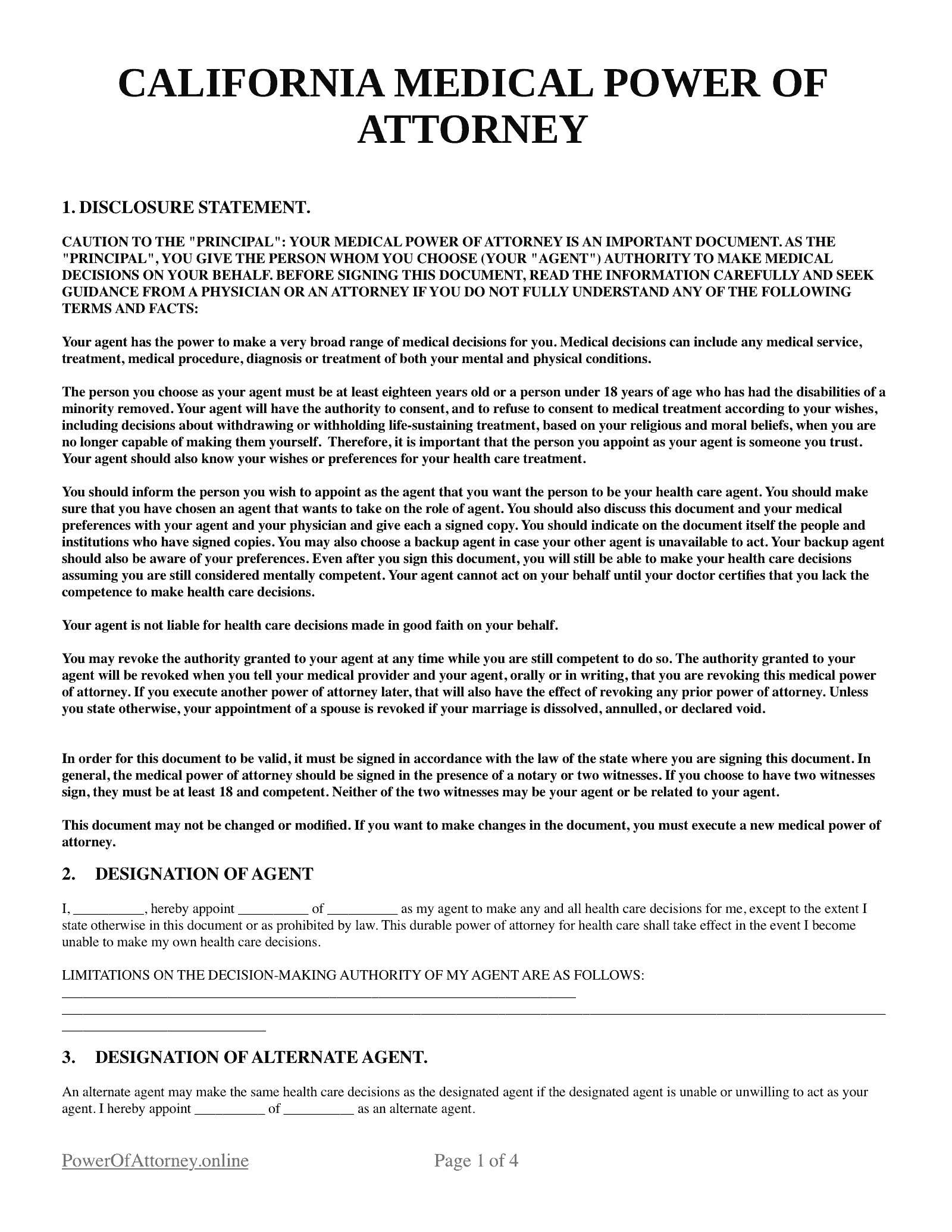Free California Medical Power of Attorney Forms
A California medical power of attorney (POA) form is a document that allows a designated individual to make medical decisions on behalf of another person. The designated person is referred to as the attorney-in-fact or agent, while the designating party is the principal. It also authorizes the agent to provide essential healthcare directives for the principal.

California Medical Power of Attorney Laws
- Powers of Attorney for Healthcare - This section of the California Probate Code states, “A power of attorney for healthcare is legally sufficient if it satisfies the requirements of Section 4673” (California Probate Code § 4680). Section 4673 cites the requirements for an advanced written legal healthcare directive (California Probate Code § 4673).
- Uniform Health Care Decisions Act - This part of the California Probate Code discusses Advance Health Care Directive, which states in part, “You have the right to give instructions about your own healthcare. You also have the right to name someone else to make healthcare decisions for you” (California Probate Code § 4701).
Signing Requirements in California
Based on the Uniform Health Care Decisions Act, the attorney-in-fact must sign and date the California medical power of attorney. The same form must also have the signatures of at least two witnesses and be done in front of a notary public. If the principal is incapacitated, they can designate somebody else to sign on their behalf.
The document must be ratified with the principal’s permission and in front of the two witnesses (California Probate Code § 4701).
How To Write a Medical POA in California
Here is a step-by-step list of what you need to do to create a medical POA in California.
1. Name your agent
Find an attorney-in-fact or agent you can trust to make healthcare decisions for you. It should be someone who acts in your best interest, even if a medical POA is mostly a legal transaction.
This may be a necessary document in case you become incompetent and unable to make sound decisions regarding your healthcare. The chosen agent should not be directly involved in your healthcare. They must not be an employee of your care facility or a supervising healthcare provider.
2. Download a printable California Medical POA Form
After downloading your template, read the contents of the medical POA, particularly the part that outlines the authority that will be awarded to the agent.
3. Provide specific healthcare instructions
There will be a section where you can list your terms and preferences regarding your healthcare, such as the provision or withdrawal of treatment and pain relief if your medical situation worsens. You can also write down your end-of-life decision.
You can choose to limit your agent’s medical authority. For example, if you choose not to specify any limitations, the agent will have the right to allow or refuse medical treatments or procedures, select or discharge healthcare providers, donate your organs and other body parts, and decide on how to dispose of your remains.
4. Designate a physician
Name the physician who will have primary responsibility over your healthcare and include them in the document. It’s best to appoint your regular doctor because they will already know your medical history.
5. Talk to your prospective agent
Make sure the person you want to designate as an agent is on board with the provisions of the POA. Brief them and give them time to make an informed decision. Remember that this is not an easy task to undertake, so it is good to have another candidate in mind should the first you ask decline the responsibility.
6. Sign the document
Sign the medical POA and indicate the date when you signed it. Have two qualified witnesses sign the same document and have it notarized. If you are unable to sign because you are incapacitated, ask someone you trust to sign for you in front of the two witnesses.
7. Distribute copies of the POA
Give signed copies of the medical POA to your agent, healthcare provider or institution, and physician. Keep your copy in a safe place. Know that you have the right to revoke the POA anytime you wish.